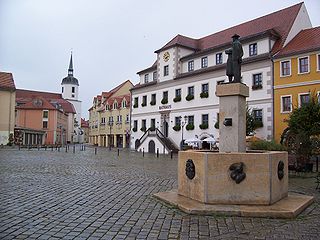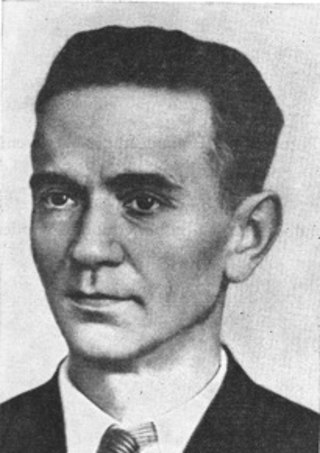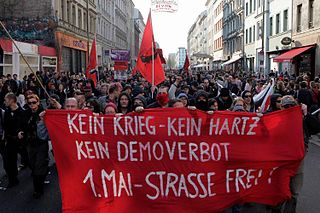Related Research Articles

Hoyerswerda or Wojerecy is a major district town in the district of Bautzen in the German state of Saxony. It is located in the Sorbian settlement area of Upper Lusatia, in which the Upper Sorbian language is spoken in addition to German.

Bernhard Bästlein was a German Communist and resistance fighter against the Nazi régime. He was imprisoned very shortly after the Nazis seized power in 1933 and was imprisoned almost without interruption until his execution in 1944, by the Nazis. Nonetheless, he was one of the most important leaders of German Resistance.

Weiß & Schwarz is a work consisting of two albums by German rock band Böhse Onkelz. Both were released at the same time in 1993. The track numbering begins with 1 through 12 on Weiß and ends with 13 through 23 on Schwarz.

Right-wing terrorism, hard right terrorism, extreme right terrorism or far-right terrorism is terrorism that is motivated by a variety of different right-wing and far-right ideologies. It can be motivated by Ultranationalism, neo-Nazism, anti-communism, neo-fascism, ecofascism, ethnonationalism, religious nationalism, anti-immigration, anti-semitism, anti-government sentiment, patriot movements, sovereign citizen beliefs, and occasionally, it can be motivated by opposition to abortion, tax resistance, and homophobia. Modern right-wing terrorism largely emerged in Western Europe in the 1970s, and after the Revolutions of 1989 and the dissolution of the Soviet Union in 1991, it emerged in Eastern Europe and Russia.
The German Alternative was a minor neo-nazi group set up in Germany by Michael Kühnen in 1989.
The National Offensive was a German neo-Nazi party, which existed from 3 July 1990 to 22 December 1992.

From August 22 to August 24, 1992 violent xenophobic riots took place in the Lichtenhagen district of Rostock, Germany; these were the worst mob attacks against migrants in postwar Germany. Stones and petrol bombs were thrown at an apartment block where asylum seekers lived. At the height of the riots, several hundred militant right-wing extremists were involved, and about 3,000 neighbourhood onlookers stood by, applauding them.

The Solingen arson attack was one of the most severe instances of xenophobic violence in modern Germany. On the night of 28–29 May 1993, four young German men belonging to the far right skinhead scene, with neo-Nazi ties, set fire to the house of a large Turkish family in Solingen in North Rhine-Westphalia, Germany. Three girls and two women died; fourteen other family members, including several children, were injured, some of them severely. The attack led to violent protests by Turkish diaspora members in several German cities and to large demonstrations of other Germans expressing solidarity with the Turkish victims. In October 1995, the perpetrators were convicted of arson and murder and given prison sentences between 10 and 15 years. The convictions were upheld on appeal.
The far-right in Germany slowly reorganised itself after the fall of Nazi Germany and the dissolution of the Nazi Party in 1945. Denazification was carried out in Germany from 1945 to 1949 by the Allied forces of World War II, with an attempt of eliminating Nazism from the country. However, various far-right parties emerged in the post-war period, with varying success. Most parties only lasted a few years before either dissolving or being banned, and explicitly far-right parties have never gained seats in the Bundestag post-WWII.

Vietnamese people in Germany(Vietnamese: Việt kiều Đức / Người Việt tại Đức; German: Vietnamesen in Deutschland) form one of the country's largest groups of resident foreigners from Asia. Federal Statistical Office figures show 103,260 Vietnamese nationals residing in Germany at the end of 2020, which is the fourth largest community from Asia excluding transcontinental, Caucusus and Middle Eastern states. Not included in those figures are individuals of Vietnamese origin or descent who have been naturalised as German citizens. Other data from 2020 shows 183,000 people of Vietnamese descent, of which 117,000 have a migration background.
Center Sandholm, or Sandholm, is a public institution for asylum seekers in Denmark. It is located in Sandholm, Blovstrød, Allerød Kommune. Children and young people under 18 who have fled alone are received at Center Gribskov. It is a former military barracks and the largest reception center for asylum seekers in Denmark. The center's daily operations are run by the Danish Red Cross. It also serves as both a receiving and departure center, for newly arrived asylum seekers, and asylum seekers who have been rejected; however, this later group will eventually be moved over to the Sjælsmark deportation camp. Separated from the Red Cross facility, Sandholm also offers a branch of the Immigration Service, the National Police Immigration Department, and Ellebæk, a penal institutions for detained asylum seekers.

May Day in Kreuzberg refers to the street festivals and demonstrations organized by left-wing and far-left groups on May 1, International Workers' Day, in the Berlin district of Kreuzberg. Specifically, the term may refer to the 1 May 1987, when particularly severe rioting in Kreuzberg led to the Berlin police having to completely withdraw from the eastern area of Kreuzberg, SO 36, for several hours. Since then, autonomists and anti-fascist groups have held so-called "Revolutionary 1st of May Demonstrations" almost every year.

Identitäre Bewegung Österreich is an Austrian far-right nationalist and Neue Rechte organization. Inspired by the French Bloc identitaire, it belongs to the pan-European Identitarian movement and is the Austrian branch of the organization known as Generation Identity (GI).
Patriotic Europeans Against the Islamisation of the West, abbreviated Pegida, is a pan-European, anti-Islam, far-right extremist political movement. German Pegida believes that Germany is being increasingly Islamicised and defines itself in opposition to Islamic extremism.
The 2016 Sacramento riot was a civil disorder at a neo-Nazi and alt-right rally outside the California State Capitol in Sacramento, California on June 26, 2016. Alt-right and neo-Nazi groups including the Traditionalist Workers Party and other white supremacist groups were involved. Counter-protestors arrived at the rally to oppose the neo-Nazis and white supremacy. This included Antifa and their allies. Ten people were hospitalized for stabbing and laceration wounds with the majority of those hospitalized being counter-protesters.
Crimes may be committed both against and by immigrants in Germany. Crimes involving foreigners have been a longstanding theme in public debates in Germany. In November 2015, a report that was released by the Federal Criminal Police (BKA) stated that "While the number of refugees is rising very dynamically, the development of crime does not increase to the same extent." Interior Minister Thomas de Maizière (CDU) noted that "refugees are on average as little or often delinquent as comparison groups of the local population." A 2018 statistical study by researchers at the University of Magdeburg using 2009-2015 data argued that, where analysis is restricted to crimes involving at least one German victim and one refugee suspect and crimes by immigrants against other immigrants are excluded, there is no relationship between the scale of refugee inflow and the crime rate. In 2018 the interior ministry under Horst Seehofer (CSU) published, for the first time, an analysis of the Federal Police Statistic, which includes all those who came via the asylum system to Germany. The report found that the immigrant group, which makes up about 2% of the overall population, contains 8.5% of all suspects, after violations against Germany's alien law are excluded.

The 2018 Chemnitz protests took place in Chemnitz, in the German state of Saxony. In the early morning of 26 August, after a festival celebrating the city's founding, a fight broke out resulting in the death of a German man and serious injuries to two other people. Two Kurdish immigrants, one from Iraq and the other from Syria, were named as suspects. The incident reignited the tensions surrounding immigration to Germany, which had been ongoing since 2015, and the European migrant crisis. In response, mass protests against immigration were ignited by far-right groups. The protests spawned riots and were followed by counter-demonstrations.

Since April 2020, when Germany's Federal Constitutional Court ruled that the governmental lockdown imposed in March to counter the COVID-19 pandemic did not allow blanket bans on rallies, numerous protests have been held in Germany against anti-pandemic regulations. The protests attracted a mix of people from varied backgrounds, including supporters of populist ideas who felt called to defend against what they saw as an arrogant central government; supporters of various conspiracy theories; and sometimes far right-wing groups. Anti-vaxxers generally also formed a major part of the protesters. Some protesters held strongly negative views towards public media, who they believed to report in an unfair manner; repeatedly, journalists covering the rallies were subjected to harassment and physical attacks. Such attacks were the main reason why Germany slipped from eleventh to 13th place in the Press Freedom Index of Reporters Without Borders, according to a report published on 20 April 2021.

In Finland, the far right was strongest in 1920–1940 when the Academic Karelia Society, Lapua Movement, Patriotic People's Movement (IKL) and Export Peace operated in the country and had hundreds of thousands of members. In addition to these dominant far-right and fascist organizations, smaller Nazi parties operated as well.
Gruppe S, named after founder Werner S., was an alleged far-right terrorist group in Germany that emerged on the internet in September 2019 and was dismantled in February 2020 with the arrest of several militants. They are said to have armed themselves in a few months, conducted target practice and planned simultaneous assassinations of Muslims in mosques, prominent politicians and people close to anti-fascist movements.
References
- ↑ Kinzer, Stephen, "A Wave of Attacks On Foreigners Stirs Shock in Germany", The New York Times (1 October 1991)
- ↑ "Nazis feiern Hoyerswerda-Pogrom". redok. 1 October 2006. Archived from the original on 30 November 2013. Retrieved 13 September 2013.
- ↑ "Rechtsextreme sind in Hoyerswerda aktiv" [Right-wing extremists are active in Hoyerswerda]. Lausitzer Rundschau (in German). 13 July 2007. Archived from the original on 18 October 2013.